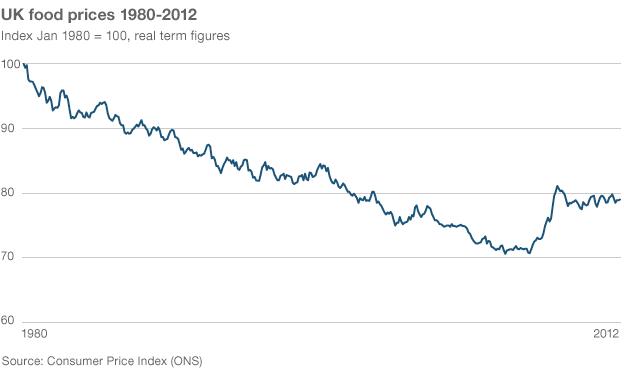Horsemeat scandal: Retailers to give regular food test updates
- Published
Environment Secretary Owen Paterson: "It is up to food businesses to complete tests, publish results and convince the public"
UK food retailers have agreed to update ministers on DNA testing on processed beef every three months, according to Environment Secretary Owen Paterson.
The news comes after Mr Paterson met with supermarket executives to discuss how to restore consumer confidence in the wake of the horsemeat scandal.
He also said the results of almost all the tests ordered by the Food Standards Agency so far would be ready by Friday.
Retailers said they were "taking their responsibilities very seriously".
Downing Street stressed it was up to the food industry to rebuild trust among consumers.
The Drink Federation and the Institute of Grocery Distribution were among other groups which took part in the talks with Mr Paterson in Westminster.
The scandal emerged in mid-January, when Irish food inspectors announced they had found traces of horsemeat in some frozen beefburgers stocked by UK supermarkets including Tesco, Iceland and Lidl.
A number of stores and suppliers across the UK and Europe have since removed products labelled as beef after test results revealed they contained varying quantities of horsemeat - in some cases up to 100%.
In the wake of the discoveries, the Food Standards Agency (FSA) ordered food businesses to carry out widespread tests on all processed beef products, including burgers, meatballs and lasagne.
It said the first set of 2,501 test results - released on Friday - had shown that no new products had been identified as containing more than 1% horsemeat. Further results are expected at the end of the week.
'Engage with customers'
Speaking after Monday's talks, Mr Paterson described the meeting as "most constructive", adding there had been a "real sense of commitment" from everyone to "work together to rebuild the certainty and trust consumers deserve".
"An update on test results from throughout the food industry will be published by the FSA next Friday, with a further update to be published on Friday 1 March," he said.
"After that, food businesses will update the FSA on their test results every three months.
"Looking ahead, there was absolute determination in the industry to restore confidence in their products, and I'm pleased to say we look forward to meeting on a regular basis to make absolutely clear that when consumers buy a product they get what they bought."
Iceland chief executive Malcolm Walker: "We don't test for dog and cat either"
British Retail Consortium director Helen Dickinson told BBC News that retailers were addressing the crisis by communicating with customers "on a day-to-day basis", updating training for staff, and trying to establish the causes of failures in the supply chain through further testing.
"Retailers take their responsibilities very seriously and are doing everything they can to maintain consumer confidence and increase surveillance," she said.
'Deep clean'
Meanwhile, it emerged on Monday that the supplier of an Asda bolognese sauce that had been removed from shelves had restarted full production at its Bristol site, following a "deep-clean" at the weekend.
Greencore, which makes chilled food and own-brand sandwiches for some UK supermarkets, said all other products from its factory had tested negative for horse DNA.
In France, the AFP news agency reported that meat-processing company Spanghero - which was suspended after being accused of knowingly selling horsemeat as beef - had had its licence partially renewed, enabling it to produce minced meat, sausages and ready meals, but not frozen meat.
Meanwhile, 24% of 2,257 UK adults surveyed by Consumer Intelligence said they would buy less processed meat in the wake of the scandal.
And 21% said they had already started buying less meat in general, while 62% said they were more likely to buy their meat from independent shops.

- Published18 February 2013
- Published14 February 2013